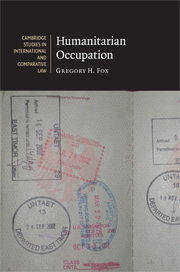Introduction
Published online by Cambridge University Press: 02 February 2010
Summary
State autonomy is said to be a fundamental principle of international law. At the heart of the autonomy principle lies a guarantee that nations will enjoy self-government – the capacity to make political, social, economic and other policy decisions without external interference. In order for a state even to come into existence it must have the means to exercise autonomy, namely a government. Autonomy was the great rallying cry of the decolonization movement of the 1950s and 60s; in the words of a landmark General Assembly resolution, it was the belief in the “inalienable right” of all peoples “to complete freedom, the exercise of their sovereignty and the integrity of their national territory.”
Of course, autonomy is by no means absolute. For one, legal protection of human rights circumscribes state discretion when individual freedoms are at stake. Some have also written of a right to democratic government, calling into question states' freedom to select their leaders in any way they choose. And in the post-Cold War era, a concern with destructive civil wars has led the international community to address a wide variety of domestic political questions when assisting in post-war reconstruction efforts. But despite the decreasing number of issues subject to exclusive domestic jurisdiction, international law has generally not been understood to reach a state's capacity for self-government.
That assumption is now under challenge. In Kosovo, Bosnia, East Timor and Eastern Slavonia, with important variations in each case, international actors have effectively become national governments.
- Type
- Chapter
- Information
- Humanitarian Occupation , pp. 1 - 14Publisher: Cambridge University PressPrint publication year: 2008



